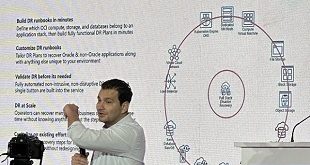
How a cup before a nap helps you power through the day
|CHIN MOI CHOW| Caffeine and napping have something in common. Both make you feel alert and can enhance your performance, whether that’s driving, working or studying. But some people are convinced that drinking a coffee before a nap gives you an extra zap of energy when you wake up.
How could that be? Is there any evidence to back the power of these so-called coffee naps? Or are we better off getting a good night’s sleep?
If you don’t get enough sleep, you incur what researchers call a sleep debt. You can build up a sleep debt without realising it, on purpose or when you feel you have no other option, like to meet work or other deadlines.
Taking a nap is a common way of overcoming your sleepiness and repaying your sleep debt. Drinking coffee can also help us get through the day. And since the 1990s, researchers have been studying how combining the two might help.
In a 1997 study, 12 sleep-deprived people drank the equivalent of one large cup of brewed coffee and five minutes later had the chance to nap for 15 minutes. They then did some driving tests in a simulator to check their alertness.
Although drinking a coffee (without a nap) helped their driving performance, combining caffeine with a nap (a coffee nap) improved it even further. People who took a coffee nap were less likely to drift out of their lanes on a two hour monotonous simulated drive, compared to when they just drank a coffee (and had no nap) or when they had a decaffeinated coffee (and without a nap).
A coffee nap even helped performance if people dozed during their nap time rather than falling into a deeper sleep. A coffee nap also reduced sleepiness once people got up, with people remaining alert for a couple of hours.
However, this early, small study raised many questions. For instance, we don’t know how much coffee the people in the study were used to drinking or if they were what researchers call caffeine-naive and so more likely to experience a greater caffeine “hit”.
How might coffee naps work?
To understand how a coffee nap might work, we need to look at how the body processes caffeine. When you drink a coffee, the caffeine stays in the stomach for a while before moving to the small intestine. It is from here that caffeine is absorbed and distributed throughout the body. This process, from drinking to absorption, takes 45 minutes.
But caffeine’s alerting effect kicks in sooner, about 30 minutes after drinking. So, drinking a coffee just before a short nap of less than 15 minutes doesn’t affect the nap as your body hasn’t yet experienced the caffeine hit.
Once you wake up from your nap, not only do you experience the hit, your body feels the effects of the caffeine hours later. Although caffeine is broken down in the liver, half of it remains in the blood for 4-5 hours after drinking a moderate amount (equivalent to two large cups of brewed coffee). It takes more time to eliminate greater amounts of caffeine from the body.
It is this caffeine hit after you wake up and the “long tail” of caffeine in your body that helps you power through the day.
How caffeine naps help you stay alert.
But if you mis-time your nap, for instance taking it after the caffeine hit and not before, this will mess up your sleep and your performance. This can happen if you wait too long after drinking your coffee before taking your nap.
If we consider caffeine consumption, doses of 300-500mg a day (equivalent to 2-3 large cups of brewed coffee) seem safe, as about 70% of caffeine is converted into paraxanthine, which has no apparent toxic effects.
But drinking too much caffeine (more than 500mg a day) can produce symptoms of nervousness, anxiety, irritability, and body effects of restlessness, palpitation, agitation, chills, tremors and increased urine flow.
It’s easy to consume more caffeine than we need. Drinks containing caffeine are on our supermarket shelves (such as Red Bull and V energy drinks) and in over-the-counter medicines (such as Panadol Extra). You can keep an eye on your caffeine intake by checking the caffeine content of common drinks, foods and medicines.
If you are drinking too much caffeine and want to stop, withdrawal can cause headache, sleepiness and decreased alertness. So, given the addictive properties of caffeine, “caffeine use disorder” has been classified as “a condition for further study” in the Diagnostic and Statistical Manual of Mental Disorders (DSM-5).
Are coffee naps the best way to pay back sleep debt?
While coffee naps will power you for a couple of hours, they’re not the best way to pay back your sleep debt.
Getting enough sleep on most days is a better solution for alertness, performance and productivity. That’s because sleeping is vital for a range of brain and body functions.
Getting enough sleep also reduces your risk of a car accident, weight gain, obesity, diabetes and depression.
****
Chin Moi Chow is Associate Professor of Sleep and Wellbeing, University of Sydney
 The Independent Uganda: You get the Truth we Pay the Price
The Independent Uganda: You get the Truth we Pay the Price



